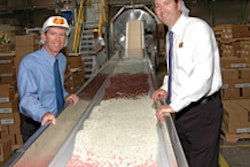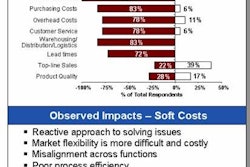St. Petersburg, Russia — September 29, 2008 — "If logistics is the engine of globalization, Russia is operating with at most one cylinder." So says Wolfgang Grassl, principal and Russian expert at supply chain management consultancy BrainNet.
According to Russia's roads authority Rosavtodor, the country would need to invest nearly $60 billion per year in the expansion of its road network alone to keep pace with the West. Lost orders resulting from inadequate infrastructure and a lack of logistics expertise are causing annual losses to the national economy on a scale of billions.
However, the urgency of the problem has been recognized at the highest levels of government, where there is now a willingness to take action, according to Grassl.
No Global Procurement Structures
The reasons behind the lack of investment are manifold. There is a severe shortage of logistics experts aged 30 to 50; towards the end of the Soviet era there was little modernization or new building, so studying engineering and logistics became a less attractive option; and about half of the country's construction machinery is obsolete.
In addition, many of Russia's state-owned and semi-state-owned companies still have no global procurement structures. The structural imbalance is also reflected in foreign direct investments: just 2.8 per cent of investments from foreign firms found their way into the logistics industry in 2007, with the figure for raw materials during the same period being 33 per cent.
German companies are particularly affected by the shortcomings of the Russian logistics sector. With over 4,500 representations in Russia, German businesses are the country's most important trading partners. In 2007, according to the Committee on Eastern European Economic Relations, trading turnover between the two countries amounted to around €57 billion ($87 billion).
"But as a procurement market, Russia is only of interest to a small number of industries such as the glass and chemical industries and a few high-tech sectors," explained Grassl. "Raw material exports still account for the lion's share, with over 70 percent."
Conference to Address German-Russian Ties
Bringing about a change in this situation requires qualified experts, but they are in short supply. The Russian government has recognized the problem and is planning large-scale investments in infrastructure and training. This will be one of the main topics at the eighth St. Petersburg Dialog conference, due to take place between September 30 and October 3 under the patronage of Russian President Dmitri Medvedev and Germany's Federal Chancellor Angela Merkel.
Att the conference, more than 70 representatives of public life from Germany and Russia will debate current issues in the two country's partnership. The theme of this year's conference, scheduled to take place at the University of St. Petersburg, is "Russia and Germany in the Globalized World — Partners in Modernization".
Conference attendees this year are scheduled to include Christopher Jahns, rector of the European Business School (EBS), executive director of the Supply Management Institute (SMI), and president of the BrainNet administrative board. Jahns is a recognized expert in supply chain management and is well-acquainted with the Russian market. The institute he directs maintains a partnership with Moscow State University, Russia's most prominent university.
A current research project at EBS, supported by DHL, is looking into the future of express logistics in Russia. In four years, the logistics giant has invested a total of €250 million ($362 billion) in its Russian business. "The financial involvement of German companies is essential to putting the Russian logistics sector on a broader and, most importantly, sustainable footing," said Jahns. "This is the only way to make it an attractive partner that can hold its own at international level."
According to Russia's roads authority Rosavtodor, the country would need to invest nearly $60 billion per year in the expansion of its road network alone to keep pace with the West. Lost orders resulting from inadequate infrastructure and a lack of logistics expertise are causing annual losses to the national economy on a scale of billions.
However, the urgency of the problem has been recognized at the highest levels of government, where there is now a willingness to take action, according to Grassl.
No Global Procurement Structures
The reasons behind the lack of investment are manifold. There is a severe shortage of logistics experts aged 30 to 50; towards the end of the Soviet era there was little modernization or new building, so studying engineering and logistics became a less attractive option; and about half of the country's construction machinery is obsolete.
In addition, many of Russia's state-owned and semi-state-owned companies still have no global procurement structures. The structural imbalance is also reflected in foreign direct investments: just 2.8 per cent of investments from foreign firms found their way into the logistics industry in 2007, with the figure for raw materials during the same period being 33 per cent.
German companies are particularly affected by the shortcomings of the Russian logistics sector. With over 4,500 representations in Russia, German businesses are the country's most important trading partners. In 2007, according to the Committee on Eastern European Economic Relations, trading turnover between the two countries amounted to around €57 billion ($87 billion).
"But as a procurement market, Russia is only of interest to a small number of industries such as the glass and chemical industries and a few high-tech sectors," explained Grassl. "Raw material exports still account for the lion's share, with over 70 percent."
Conference to Address German-Russian Ties
Bringing about a change in this situation requires qualified experts, but they are in short supply. The Russian government has recognized the problem and is planning large-scale investments in infrastructure and training. This will be one of the main topics at the eighth St. Petersburg Dialog conference, due to take place between September 30 and October 3 under the patronage of Russian President Dmitri Medvedev and Germany's Federal Chancellor Angela Merkel.
Att the conference, more than 70 representatives of public life from Germany and Russia will debate current issues in the two country's partnership. The theme of this year's conference, scheduled to take place at the University of St. Petersburg, is "Russia and Germany in the Globalized World — Partners in Modernization".
Conference attendees this year are scheduled to include Christopher Jahns, rector of the European Business School (EBS), executive director of the Supply Management Institute (SMI), and president of the BrainNet administrative board. Jahns is a recognized expert in supply chain management and is well-acquainted with the Russian market. The institute he directs maintains a partnership with Moscow State University, Russia's most prominent university.
A current research project at EBS, supported by DHL, is looking into the future of express logistics in Russia. In four years, the logistics giant has invested a total of €250 million ($362 billion) in its Russian business. "The financial involvement of German companies is essential to putting the Russian logistics sector on a broader and, most importantly, sustainable footing," said Jahns. "This is the only way to make it an attractive partner that can hold its own at international level."









